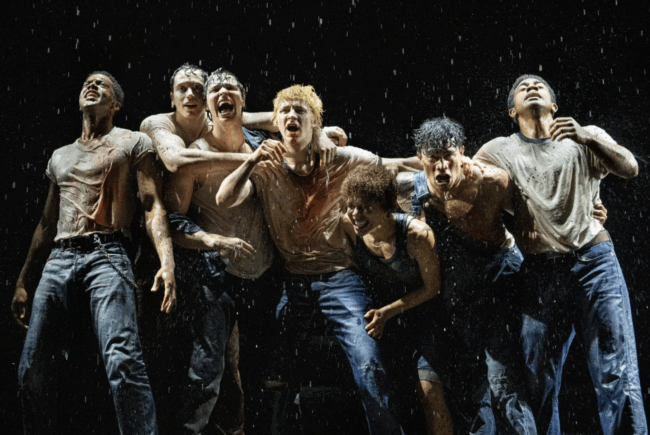As contemporary theater continues to mine classic literary and cinematic works for source material, it begins to prioritize name recognition and fame over genuine creative endeavors. The mere invocation of familiar characters who perform songs that loosely encapsulate themes of a famous story on stage does not constitute meaningful art. A successful theatrical adaptation must offer musical and visual creativity, but also a narrative interpretation that honors– and ideally enriches– the original. “The Outsiders,” a new Broadway musical directed by Danya Taymore and based on S.E. Hinton’s seminal 1967 novel, fails to warrant the story’s transformation into this new medium.
“The Outsiders” centers around 14-year-old Ponyboy Curtis, a Greaser and orphan living with his two brothers in Tulsa, Oklahoma, in the 1960s. The working-class Greasers have a bitter rivalry with the wealthier Socs. When a violent altercation ends with a Soc dead, Ponyboy and his best friend Johnny Cade go on the run.
As the narrative progresses, Ponyboy struggles with belonging and staying true to his values in a divided world. The Outsiders resonates among audiences for its candid portrayal of class division, identity and the ability to stay “gold”, a reference to Robert Frost’s 1923 poem–to remain compassionate and vigilant in the face of hardship and despair.
Adapting Hinton’s novel into a musical is an audacious move. The novel’s beauty lies in Ponyboy’s introspective narration– his astute observations, doubts and philosophical reflections are difficult to convey on stages that rely on visual spectacles. While the musical effectively portrays the external drama between the Greasers and the Socs, it fails to depict the novel’s emotional heart: Ponyboy’s internal evolution. As The Guardian aptly notes, the musical “tries very earnestly to tap the vein of uncut yearning and pent-up frustration,” but seldom succeeds.
The musical trims or omits essential aspects of the novel, resulting in a disjointed and diluted storyline. Ironically, its reductive, almost caricatured portrayal of the Greasers and Socs undermines the novel’s critique of class identity. Act I introduces promising characters like Cherry Valance who become largely forgotten in Act II. The deaths of Dally and Johnny Cade are hurriedly staged near the show’s end, depriving them of the resonance they had in Ponyboy’s life and the original story.
The musical features 19 tracks written and composed by the folk duo Jamestown Revival alongside Justine Levine. The score aims to capture the Americana spirit of 1960s Oklahoma, but the theme feels at odds with the emotionally turbulent story. Talented singers competently perform numbers like “Tulsa ‘67” and the supposed showstopper “Stay Gold,” yet the songs themselves lack the melodic memorability that ostensibly defines great musical theater. These are not tunes audiences will be humming on the way home or adding to playlists.
The set and costume design deliver several compelling moments. Taymor skillfully uses natural elements such as real fire during the famous church scene and staged rain in the climactic Greasers vs. Socs battle. Dynamic lighting and sound heighten the intensity of gang confrontations. Cigarettes, denim, leather jackets and greasy, slicked-back hair evoke the world of “The Outsiders” with convincing detail. These technical flourishes may enhance the production visually, but they cannot compensate for its musical and narrative shortcomings.
Despite its flaws, the musical garnered significant acclaim during awards season, winning Best Musical at the 77th Tony Awards. A North American tour is to begin in the fall, and tickets are available on Broadway through January 2026. Though not a failure, the show leaves one questioning the necessity of this adaptation. The production never convincingly justifies its existence in this format. It relies heavily on the legacy of Hinton’s novel, stealing its gravitas without earning its artistic merit and legitimacy. The result is a show that dazzles visually but lacks substance or meaning.
Reimagining beloved books and films on stage is not inherently problematic. When executed with creativity and purpose like “Les Misérables” and “The Phantom of the Opera,” adaptations can not only succeed but also revolutionize musical theatre. But today’s Broadway feels like an assembly line of familiar content dressed up for ticket sales.
If Broadway insists on continuing to adapt familiar works, it must move beyond echoing past greatness and commit to transforming it. It must create works that “stay gold,” instead of ones that are simply gilded by association.






